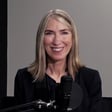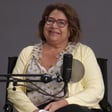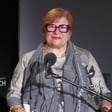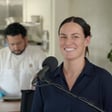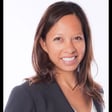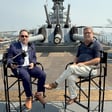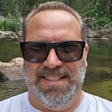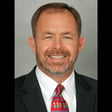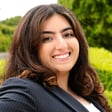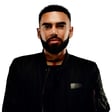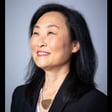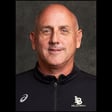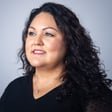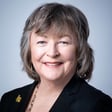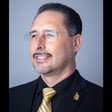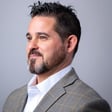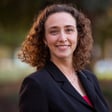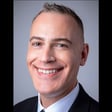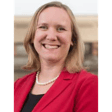Become a Creator today!Start creating today - Share your story with the world!
Start for free
00:00:00
00:00:01

Stewarding our most dedicated supporters
Alina C. Mircea-Trotz ('99, '02) speaks about CSUL:B's Planned Giving & Stewardship efforts.
Transcript
Introduction to 'At the Beach' Podcast
00:00:17
Speaker
Hello, I'm Dan Montoya, Vice President for University Relations and Development. Welcome to another episode of At the Beach. This podcast shares news of accomplishments, personal stories, and ways listeners can be involved with Cal State Long Beach, and it's produced by URD.
Introducing Alina Marcia Trotz
00:00:32
Speaker
Today, I'm delighted to introduce my guest, Alina Marcia Trotz. Welcome, Alina. Thank you, Dan. I'm excited to talk about plan giving and stewardship today.
00:00:43
Speaker
Good. I'm going to give the listeners a little bit more background on you. Alina is a seasoned fundraiser professional with over 25 years of experience, both in nonprofit and higher education, a proud first generation college graduate and two time alumni of Cal State Long Beach. Alina holds both a bachelor's degree and master's degree in public health from the beach. Alina returned to ah her alma mater in December 2020 as the executive director of strategic initiatives, and she currently serves as the assistant vice president for planned giving and stewardship.
Role of Planned Giving Office
00:01:18
Speaker
In this role, she leads the university's planned giving and stewardship team, focused on cultivating soliciting Stewartine CSULB's most committed supporters.
00:01:27
Speaker
Alina, your office is responsible for some very technical and precise aspects of fundraising. Your team's most important job is to assist friends and potential donors in understanding how a personalized financial or estate plan can benefit them in Cal State Long Beach. Let's talk about that. So my first question to you, Alina, is what is planned giving?
00:01:52
Speaker
I believe plan giving and stewardship is the heart and soul of the division. In a nutshell, we craft legacies and we steward. For plan giving, we work with donors who have chosen to arrange gifts that will benefit the university in the future. In stewardship, we share our appreciation to donors who have invested their time and their talent and their treasure with the university and we nurture those relationships.
00:02:18
Speaker
So ah ah can you elaborate elaborate a little bit more about that? So what what do you do? Sure. So there are three core beliefs, Dan, that drive our work, education, planning, and nurturing. We believe that everyone should have access to the tools and resources to protect their assets and their loved ones. And we believe in helping people get started. Did you know that less than 50% of people over the age of 55 have a will?
00:02:48
Speaker
We maintain and share a list of professional advisors to help folks get started and we suggest charitable giving strategies that will align with their goals and the level of impact that they would like to create.
Importance of Planned Giving
00:03:01
Speaker
um In nurturing, we believe in taking care of the people who have invested in Cal State Long Beach and who care about our mission and our students and our programs. So how does plan giving fit in the overall structure of URD?
00:03:18
Speaker
That's a great question. Plan giving is the practice of helping donors craft a legacy um to support a cause that they care about. It's a future gift that often is in the form of a bequest and a will or a trust or a beneficiary designation. It's often realized at the time a donor passes and it describes a gift that is intended to make a larger impact than someone could make during their lifetime.
00:03:46
Speaker
I like to think of plan giving as soul building and soul fulfilling. um It enhances a person's self sense of purpose. It's a legacy that aligns with their core value, hence the soul building. And it provides a deep sense of satisfaction and emotional fulfillment knowing that they're making a lasting impact, and that's where the soul fulfilling comes
Setting Up Planned Gifts
00:04:10
Speaker
in. It fits within URD as a a key pillar.
00:04:16
Speaker
ensuring the university's overall financial health over time. Did you know that more than 400 donors have committed over $209.5 million dollars to their to the university in the form of future gifts? And over 300 individuals of those 400 have chosen to be part of our legacy society. That's incredible.
00:04:42
Speaker
Yeah, that's over that's over the history of of the university. So that's that's pretty amazing. That's pretty amazing. Yeah. So how how long does it take to do a planned gift? and And how does one go about doing it?
00:04:57
Speaker
The time it takes really depends on the complexity of the gift. Some gifts are fairly straightforward, and so it can be accomplished in a short amount of time, including the beneficiary the university as a beneficiary of an estate plan, or a will, or say an IRA, etc.
00:05:16
Speaker
Other options take a ah lot longer due to legal processes such as a charitable remainder trust or a charitable gift annuity. The best way for folks to get started really is to reach out to our team and we can sit with them and discuss their options, look at the the different assets that they have and just their their' scenario.
00:05:36
Speaker
We also offer an amazing website called beachlegacy.org. It features various various scenarios. It also offers resources for folks to think through the impact that they'd like to make and how best to protect their assets and their loved ones.
When to Start Estate Planning
00:05:51
Speaker
We have a great platform that we offer called Giving Docs. Thank you Dan for and the Division for investing in this and offering this as an opportunity for our campus community.
00:06:00
Speaker
and the external community to utilize. On that website folks, or on that platform, folks can create a will. They can create a, um for those who live in the state of California, a living trust. They can also help ensure that they're they have their power of attorney created, etc. So there's lots of options, tools that they can utilize at no cost on giving docs. um We also offer webinars and web workshops where folks can learn a little bit more about how they can make an impact and how they can connect and things to think through and as part of their life journey. Personal consultations with attorneys and then referrals to professional advisors. So there's many ways to get started.
Remarkable Planned Gifts
00:06:43
Speaker
So about what age do people start planning or thinking about doing a trust or a will or what what is what is the ideal or prime age for people to start thinking about this?
00:06:58
Speaker
Sure, I'm not sure that there's actually an ideal. For me, personally, I thought about this when I had my son, what, almost 21 years ago, and wanted to ensure that if something should happen to my husband and and I, my my husband and I, um then he was protected. and And then I can ensure that I knew who would take care of him and um that the acids would ultimately support his care.
00:07:25
Speaker
And so technically, I'm not sure that there's an age. I think everyone should think about this. I think once folks turn 18 and they become a legal adult, they should create a power of attorney and a healthcare care directive so that their wishes are followed for how they choose um their care to be or what they choose their care to be. I think, you know, once you purchase your first home or if you have any assets, right, none of us are promised tomorrow.
00:07:52
Speaker
And so this is an important thing for each of us to think through. So the sooner you get started the better, no matter what your age. Good. So what is an example of a planned gift you are most proud of?
00:08:06
Speaker
That's a great question, Dan. um how do i How do I choose one legacy over another, right? Each gift is equally meaningful to the donor, to the institution, to the recipient. I think every journey is is um powerful and deserves to be respected and valued. um I've worked with faculty and staff and community members and retired faculty and staff in Meritai. We've created scholarships and fellowships. We've named centers. We've endowed programs. We've honored loved ones. We've celebrated those who are still with us. Every planned gift has been precious and emotional and
00:08:46
Speaker
um Can I say spiritual? Both to all of us. A recent gift that stands out to me is one in particular is a gift from a couple who chose to support two different areas on campus. The donor was a reentry student.
00:09:04
Speaker
And they they chose to support students like them. And so they're supporting the College of Business and they're supporting endowed scholarships for our Guardian Scholars Program. And those are students who um who need support, right? All of our students need support.
00:09:20
Speaker
they This couple has an incredible love for the university. They have an incredible trust for the university and and the relationships that we've built with them over time that they have chosen to to gift the university the and their entire estate.
00:09:37
Speaker
That is um the fact that they trusted us with their legacy and their assets that they have worked their entire lives to build. That's incredible. That's the emotional. That's a priceless and life-changing gift for the university and students and everyone who will receive this gift and and it was an emotional experience for the donors themselves. So i'm when I think about the gifts that that we've received and the donors that we've worked with on this journey as part of um as part of this role, it's just been I move beyond words. It's been an incredible and amazing journey to see the generosity of these donors.
Stewardship and Donor Relationships
00:10:19
Speaker
right No, it's it's wonderful to work with so many of these donors who decide to leave the university in their estate or in their will. And we we get to experience the joy that they have um by doing that. so
00:10:37
Speaker
You're right, it's it's a journey that means a lot to these folks and so um I can attest to that as well. So now let's talk a little bit about what is stewardship and how it is done.
00:10:50
Speaker
Sure, stewardship is a thoughtful process of taking care of our relationships with our donors so that they understand the impact of their gifts and that they feel valued and connected with the university. I like to refer to stewardship as donor love, right? We like to share all of our love. um It's a series of actions and experience that really promotes a meaningful engagement over time. So it's not just done in a vacuum and it isn't just done at one point.
00:11:20
Speaker
and then you move on, right? We want our donors to see and experience firsthand the impact that their generosity has made on our students and on our programs. And so it's done through personalized thank yous, it's done through financial updates or impact reports or events. The goal really is to build a lasting relationship with these individuals over time. So when does it, when exactly does stewardship come into play?
00:11:49
Speaker
So as I mentioned earlier, it's not done just at one time, right? Stewardship begins right after a donor makes their first gift and then it continues well into the future. um For planned gifts, this actually can be extended to family members. So when the the donors pass away,
00:12:08
Speaker
we We maintain relationships with their family members or their trustees or folks who the donors have chosen to represent them long after they're gone. And so we demonstrate that impact to to to folks beyond you know the initial gift.
00:12:24
Speaker
I love to share this. i love I love thinking about this. So, Dan, did you know that over 3,300 donors have supported Cal State Long Beach for more than 20 years, with more than 20 of those folks supporting the university for more than 40 years?
00:12:43
Speaker
That's incredible when you think about that, right? And that probably would not have been possible without someone saying thank you. When folks choose to invest in an institution time after time to after time for 40 years or for more than 20 years, there's something there that's pulling them back. There's something there. They see the value of supporting the university. They see the students. They see themselves. They see their legacy.
00:13:10
Speaker
They see the impact, so it's pretty powerful. So I mentioned earlier that we have secured over $209.5 million dollars in planned gift commitments over the university's history. Well, of that amount, we are expecting over $178 million. Stewardship is critical to ensuring that these donors continue to find the university to be investment worthy.
00:13:34
Speaker
That's great and and I agree it's a it's a relationship for the length of their lives and and as you mentioned future generations because sometimes it carries over and and we know several donors who have left a gift or their legacy and their children continue that so it's it's definitely a generational thing as well.
Impact of Long-Term Donor Support
00:13:57
Speaker
So how does um he how does playing even in stewardship collaborate, not just across URD, but across the university? Our work takes a village. You may have heard of the saying, many hands make light work. I like to think of it as many hands make great work.
00:14:20
Speaker
When an individual is exploring the legacy that they would like to leave or the impact that they would like to make here at the university, we work closely with our development directors, our faculty, our deans, and folks within the specific areas that the individual has expressed interest in, such as colleges, athletics, student affairs, academic affairs. And we explore opportunities for support or opportunities for impact.
00:14:49
Speaker
Likewise, in stewardship, we bring our donors together with our students and and directors to demonstrate the difference that their gift has made. We ensure that our donors' intentions are honored and that their gift is managed effectively.
00:15:05
Speaker
We also collaborate with other entities on campus, such as our human resources, to ensure that our campus community is in the know on the estate planning resources that we offered. We want everyone to be prepared. And we collaborate with our Osher Lifelong Learning Institute, commonly referred to as OLLI, which is a program for seniors.
00:15:27
Speaker
And lastly, we partner with professional advisors within the community to present webinars on estate planning tools and resources and special topics to also serve as referrals and to help us think through more complicated gift scenarios that our donors may have.
Supporting the No Barriers Campaign
00:15:46
Speaker
Great. We, we recently finished the no barriers campaign and talk to us a little bit about how plan giving and stewardship played a role in that. And then also as we move on past the campaign to the 75th, how will it play a role in that?
00:16:05
Speaker
Sure, the No Barriers campaign, um Plan Giving played a crucial role. Plan Giving and Stewardship technically played a crucial role in that campaign by ensuring that our donors felt appreciated and valued and we secured long-term commitments that will provide for the financial stability of the university over time.
00:16:24
Speaker
We held key events and experiences with our Legacy Society donors and our our Carillon Society donors. Those are the donors who've given over a certain dollar amount to the university. We've held a series of salons, intimate events, where donors, alumni, and prospects could learn a little bit more about the the different programs and opportunities and student experiences that we offer. We launched our donor loyalty initiative and that's to show love and appreciation to those who have supported the university for more than 20 years.
00:17:01
Speaker
We launched our Month of Love initiative, and that's one of my favorites, ah where we show our appreciation and love to folks during the month of February, the Month of Love. um We actually secured over $91.4 million dollars in plan gifts. That represents 29% of the funds that were raised during the campaign. We held a 75th anniversary donor celebration event where we were able to share the importance and impact that these gifts have made over the campaign.
00:17:32
Speaker
In terms of the 75th anniversary, um during anniversaries, stewardship recognizes those individuals who have played an important and critical role in the journey of the institution. Many of our planned gifts, are and just gifts in general, are tied to legacies that date back, that stretch back decades. And these milestones, the you know anniversaries in general,
00:17:57
Speaker
are milestones that are great opportunities to just say, here's where we are. And we would not have been able to reach this height without um you know your support and your
Alina's Inspirational Sources
00:18:09
Speaker
loyalties. And just to express our general gratitude for um for them helping us achieve these new heights.
00:18:17
Speaker
Right. and And again, I i think playing given his search is a critical component of university relations and development. I really appreciate how you do collaborate across not just the division, but the university. And in and I've seen how it makes a ah difference in educating many folks who don't even know about a Willard Trust. And I think that's wonderful. So let's talk a little bit about you.
00:18:44
Speaker
So what inspires you and what drives you about fundraising and in and being in higher education? Sure. um Honestly, Dan, it's my faith.
00:18:59
Speaker
I believe plan giving and stewardship are driven by core biblical principles of that emphasize generosity and responsibility and the importance of leaving a lasting impact. I believe everything we have is a gift from God and we are entrusted with managing those resources well in a way that honors God and serves others.
00:19:21
Speaker
I have a responsibility to ensure that I do all I can to leave this world a better place for the next generation, for my children, for your children, for our donor's children and grandchildren. um I'm inspired by how plan giving and stewardship can help shape the future of the university, how it can transform the lives of students and you know Students that resemble my story, right? um How I can safeguard the future by creating a stable stream of funding to support students forevermore. I have the incredible honor of helping people think through their legacy and the impact that they wish to make.
00:20:03
Speaker
here at Cal State Long Beach and ensure that the next generation is adequately prepared to enter their workforce and make a meaningful difference in society. um Every day is an opportunity to do better, to love more, to leave a legacy of faith. I think many of us want to be a part of something larger than ourselves and this work allows me to do that.
00:20:29
Speaker
That's great. So is there a motto? Is there a book or something that inspired you throughout your life that just helps you go about doing your work or doing the, you know, the the art of fundraising and plan giving and stewardship?
00:20:46
Speaker
Yes, there have been. I have had wonderful mentors over the years who have supported and guided me and given me a push to help me fly in the times that I needed it. I've also been encouraged and inspired by this book that I love called Jesus CEO written by Lori Beth Jones.
00:21:08
Speaker
The book is about using ancient wisdom for visionary leadership. I love it. To me, Jesus is the ultimate role model for leadership. His approach to management and work ethics is different to me because he lived differently, which makes me think about living differently. He mastered the strengths of self-mastery and action and relationships with discipline, love, and compassion.
00:21:38
Speaker
And that that shapes my leadership and management style, and that's done so over the years in the way that I interact with people as I go about my daily tasks, whether it's with a donor or a staff member or just a colleague. Do I get this right every day?
Preparedness and Resources
00:21:58
Speaker
Absolutely not. But to me, every day is an opportunity to do better, to be better.
00:22:05
Speaker
Good. Well, I appreciate that. And now you gave a lot of information, a lot for people to think about, right, in in terms of plant giving and stewardship. If they were going to walk away from this conversation, and there was one or two things that you would like them to remember, what what one or two things would that be?
00:22:30
Speaker
get started. Right. It's so important for folks to be prepared. I cannot stress enough. um I mentioned this earlier, but none of us are promised tomorrow. Right. Right. That's unexpected. We don't know what that will look like. And so peace of mind to me is a valuable thing. Yeah.
00:22:51
Speaker
to to know that I have, if something should happen, that I have closely safeguarded my family and my assets, and and I've written that down, and I've made a plan. Ultimately, there's certain things that that may be out of our control, but this I can, right? This is something I can do to ensure that the that my family will not have the stress of worrying about what's next.
00:23:19
Speaker
Yeah, and i think I think that is a valid point because what happens when when they don't do that, right? It it goes to the courts and they've got to fight the court for the assets, or somebody else makes a decision about the individual's possessions or wealth or whatever it is. Or children or family. right And then and then what, right? It's it's chaos. And so, um yeah, this the work of organizing your possessions is so important. So I think there's a lot of great resources that you've given. I know you mentioned the website that you're also on LinkedIn. um ah What other what other ways can they, you know, stay connected ah to the information that your office produces?
00:24:09
Speaker
Well, the website is the best place for them to go to. Our contact information is there. um it it is a It offers videos. It offers just many different resources for folks to just think through their options.
00:24:24
Speaker
Right? And once they have a better understanding of that, they call us and we can we can also help them think through. But folks can, on the website, folks can think through, you know, im I fall within this age bracket. What should I be thinking of if I'm between 55 and 65?
00:24:42
Speaker
or if I'm between this age, etc., or I have these assets that have significantly appreciated over time, how how best do I utilize these so I can ah support my family and and my loved ones, but also support a cause I care about? There are some assets that are not great to leave family, and there are other assets that are better to leave family, and so we help them think through some of these things.
00:25:07
Speaker
That's great. Yeah. um Again, I encourage you listeners, if if you haven't done that, let us help you. It's a great opportunity. We have a staff that's willing to sit down with you and and just go through a lot of these questions that you may have. And so, Alina, I thank you for spending time with us. Thank you for your leadership and for continuing to grow that. I know we recently hired a director of stewardship, so I'm excited to see what that individual will do in the in the coming weeks and months and years. and how Plang even in stewardship will continue to grow at the beach. Me too. So that concludes another edition of At the Beach. I'm your host Dan Montoya, Vice President for University Relations and Development, which produces this podcast. Thank you for listening. As always, we'll end with a Go Beach on three. One, two, three. Go Beach!
